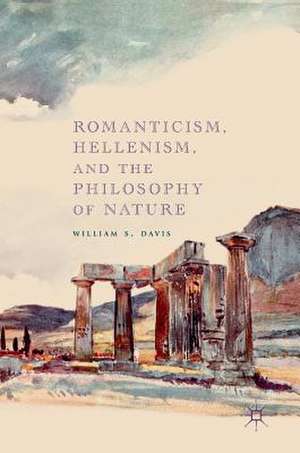Romanticism, Hellenism, and the Philosophy of Nature
Autor William S. Davisen Limba Engleză Hardback – 9 iul 2018
This book investigates intersections between the philosophy of nature and Hellenism in British and German Romanticism, focusing primarily on five central literary/philosophical figures: Friedrich Schelling, Friedrich Hölderlin, Johann Wolfgang von Goethe, Percy Shelley, and Lord Byron. Near the end of the eighteenth century, poets and thinkers reinvented Greece as a site of aesthetic and ontological wholeness, a move that corresponded with a refiguring of nature as a dynamically interconnected web in which each part is linked to the living whole. This vision of a vibrant materiality that allows us to become “one with all that lives,” along with a Romantic version of Hellenism that wished to reassemble the broken fragments of an imaginary Greece as both site and symbol of this all-unity, functioned as a two-pronged response to subjective anxiety that arose in the wake of Kant and Fichte. The result is a form of resistance to an idealism that appeared to leave little roomfor a world of beauty, love, and nature beyond the self.
| Toate formatele și edițiile | Preț | Express |
|---|---|---|
| Paperback (1) | 379.48 lei 6-8 săpt. | |
| Springer International Publishing – 22 dec 2018 | 379.48 lei 6-8 săpt. | |
| Hardback (1) | 468.90 lei 6-8 săpt. | |
| Springer International Publishing – 9 iul 2018 | 468.90 lei 6-8 săpt. |
Preț: 468.90 lei
Preț vechi: 551.65 lei
-15% Nou
Puncte Express: 703
Preț estimativ în valută:
89.72€ • 93.68$ • 74.26£
89.72€ • 93.68$ • 74.26£
Carte tipărită la comandă
Livrare economică 04-18 aprilie
Preluare comenzi: 021 569.72.76
Specificații
ISBN-13: 9783319912912
ISBN-10: 3319912917
Pagini: 166
Ilustrații: XV, 156 p.
Dimensiuni: 148 x 210 x 16 mm
Greutate: 0.36 kg
Ediția:1st ed. 2018
Editura: Springer International Publishing
Colecția Palgrave Macmillan
Locul publicării:Cham, Switzerland
ISBN-10: 3319912917
Pagini: 166
Ilustrații: XV, 156 p.
Dimensiuni: 148 x 210 x 16 mm
Greutate: 0.36 kg
Ediția:1st ed. 2018
Editura: Springer International Publishing
Colecția Palgrave Macmillan
Locul publicării:Cham, Switzerland
Cuprins
1. Introduction: Romantic Hellenism, the Philosophy of Nature, and Subjective Anxiety.- 2. Intellectual Intuition: With Hölderlin, “Lost in the Wide Blue".- 3. The Philosophy of Nature: Goethe, Schelling, and the World Soul.- 4. Aesthetic/Erotic Intuition: Hölderlin, Shelley, and the Islands of the Archipelago.- 5. Coda: with Byron on Acrocorinth.
Recenzii
“Romanticism, Hellenism, and the Philosophy of Nature nonetheless provides interesting analyses that help reassess these divergent paths. The possibility of such a reassessment is found in the structure of Davis’s book, which is framed by an interesting idea that illuminates both post post-Kantian philosophy and logical empiricism.” (Adam Tamas Tuboly, Comparative and Continental Philosophy, April 01, 2019)
Notă biografică
William S. Davis is an associate professor of Comparative Literature and German at Colorado College, USA.
Textul de pe ultima copertă
This book investigates intersections between the philosophy of nature and Hellenism in British and German Romanticism, focusing primarily on five central literary/philosophical figures: Friedrich Schelling, Friedrich Hölderlin, Johann Wolfgang von Goethe, Percy Shelley, and Lord Byron. Near the end of the eighteenth century, poets and thinkers reinvented Greece as a site of aesthetic and ontological wholeness, a move that corresponded with a refiguring of nature as a dynamically interconnected web in which each part is linked to the living whole. This vision of a vibrant materiality that allows us to become “one with all that lives,” along with a Romantic version of Hellenism that wished to reassemble the broken fragments of an imaginary Greece as both site and symbol of this all-unity, functioned as a two-pronged response to subjective anxiety that arose in the wake of Kant and Fichte. The result is a form of resistance to an idealism that appeared to leave little room for a world ofbeauty, love, and nature beyond the self.
Caracteristici
Engages with Romantic Hellenism in Germany and England Focuses on five crucial figures who straddle the domains of philosophy and poetry Argues that the study of Romanticism benefits from an understanding of Kantian ideas
